The (almost) complete history of 'fake news'
- Published
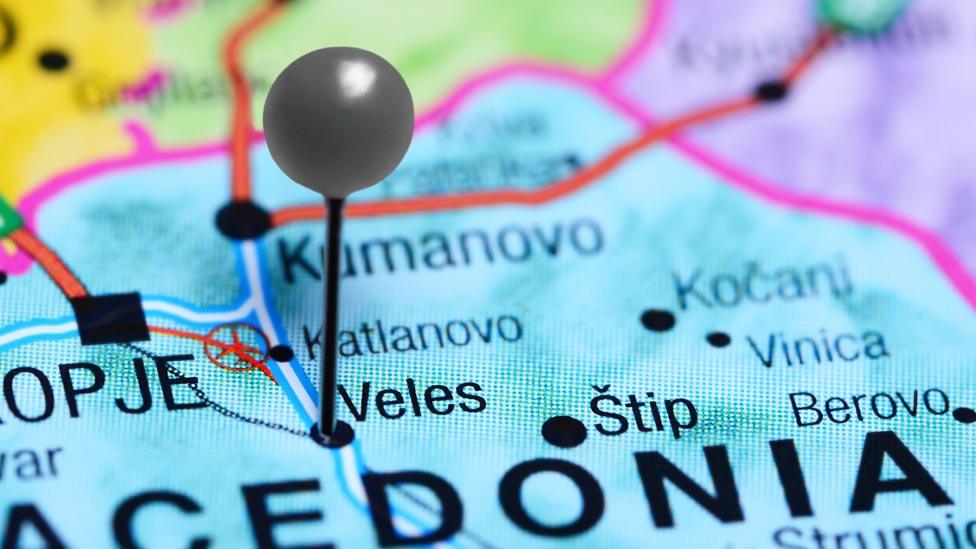
In record time, the phrase morphed from a description of a social media phenomenon into a journalistic cliche and an angry political slur. How did the term "fake news" evolve - and what's next in the world of disinformation?
It was mid-2016, and Buzzfeed's media editor, Craig Silverman, noticed a funny stream of completely made-up stories that seemed to originate from one small Eastern European town.
"We ended up finding a small cluster of news websites all registered in the same town in Macedonia called Veles," Silverman recalls.
He and a colleague started to investigate, and shortly before the US election they identified at least 140 fake news websites which were pulling in huge numbers on Facebook, external.
The young people in Veles may or may not have had much interest in American politics, but because of the money to be made via Facebook advertising, they wanted their fiction to travel widely on social media. The US presidential election - and specifically Donald Trump - was (and of course still is) a very hot topic on social media.
And so the Macedonians and other purveyors of fakery wrote stories with headlines such as "Pope Francis Shocks World, Endorses Donald Trump for President" and "FBI Agent Suspected in Hillary Email Leaks Found Dead in Apparent Murder-Suicide".
They were completely false. And thus began the modern - and internet-friendly - life of the phrase "fake news".
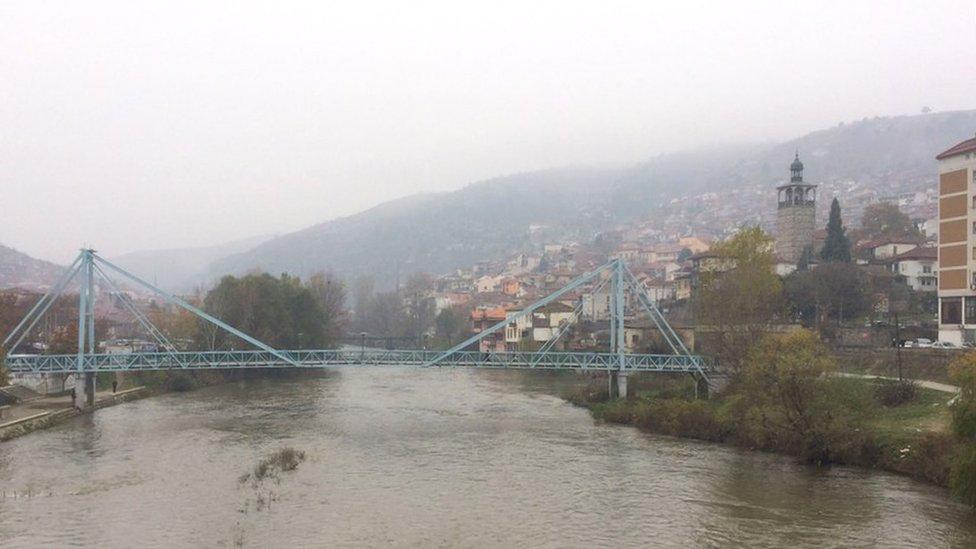
A cluster of sites run from Veles sparked interest in the role of Facebook algorithms in spreading fake viral stories

Hear the conversation

Nothing new here
Misinformation, spin, lies and deceit have of course been around forever. But what Silverman and others uncovered was a unique marriage between social media algorithms, advertising systems, people prepared to make stuff up to earn some easy cash and an election that gripped a nation and much of the world.
In the wake of President Trump's victory, BBC Trending delved into the huge world of pro-Trump Facebook groups. Inside those hyper-partisan spaces there were some outright falsehoods circulating.

But most of the content was more traditional political communication: puffery, drumbeating, and opponent-slagging. There were memes showing Trump as a fearless leader, support for his pledges to deport illegal immigrants, and potted biographies describing the candidate as "the very definition of the American success story." It was hardly balanced stuff - but nor did much of it qualify as "fake news".
But pundits scrambling to explain the shock result (and in many cases, their own follies) turned to "fake news" as one possible explanation.
Enter politics
The phrase now evokes much more than those get-rich-quick Macedonian teenagers. President Trump even gave out "Fake News Awards", external to reporters who had made errors or poor predictions - with a special nod to all reporting on the ongoing and very real investigations into collusion between the Trump campaign and Russia.
But to say that President Trump was the first politician to deploy the term would itself be, well, "fake news".
On 8 December 2016, Hillary Clinton made a speech in which she mentioned "the epidemic of malicious fake news and false propaganda that flooded social media over the past year."
"It's now clear that so-called fake news can have real-world consequences," she said. "This isn't about politics or partisanship. Lives are at risk… lives of ordinary people just trying to go about their days, to do their jobs, contribute to their communities."
Some journalists at the time interpreted her remarks, external as a reference to "Pizzagate", a bonkers conspiracy theory which sprouted and grew to tremendous proportions online.
It started with a rumour that sex slaves were being held under a Washington pizza restaurant, and ended a couple of days before Clinton's speech, when a man entered the busy family-friendly restaurant with a rifle. Nobody was injured, and the man was arrested and sentenced to four years in jail.
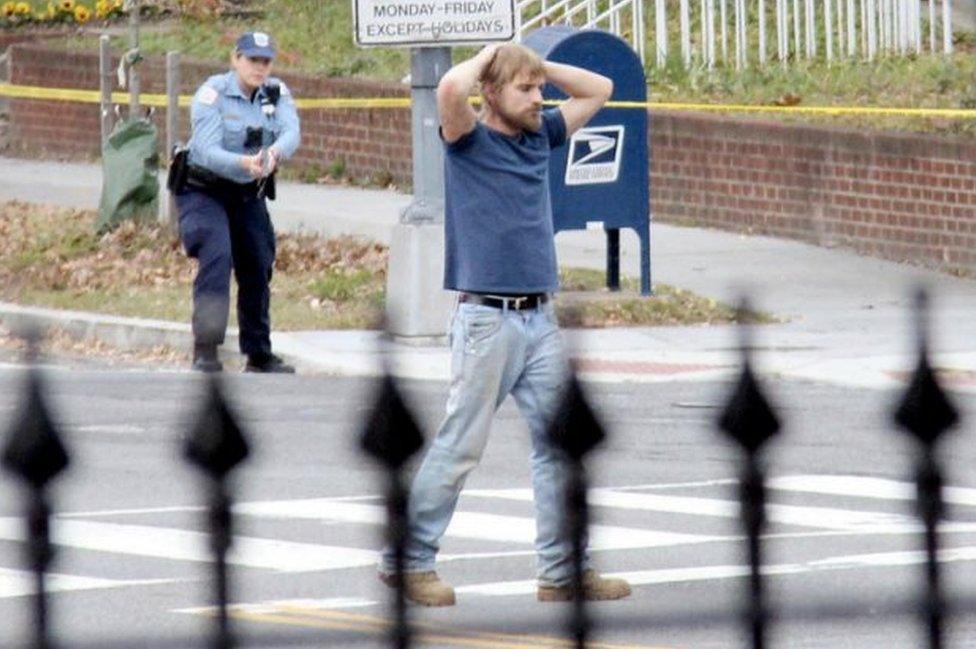
The moment Edgar Maddison Welch was captured. Inspired by "pizzagate" conspiracy theories, Welch burst into a restaurant armed with a rifle and pistol. The incident inspired Hillary Clinton's fake news speech
But in that speech, Clinton also asked her audience to help "protect our democracy". Other reporters interpreted that more broadly as a reference to the election.
President-elect Trump took up the phrase the following month, in January 2017, a little over a week before taking office. In response to a question, he said "you're fake news" to CNN reporter Jim Acosta. Around the same time he started repeating the phrase on Twitter.
Allow X content?
This article contains content provided by X. We ask for your permission before anything is loaded, as they may be using cookies and other technologies. You may want to read X’s cookie policy, external and privacy policy, external before accepting. To view this content choose ‘accept and continue’.
"That signalled to the many people out there who were supporting Trump and running websites supportive of him, that he was saying 'OK, we're going to take this term and make it ours'," Silverman says.
The fake news horse had not just bolted from the stable, it was off and running.
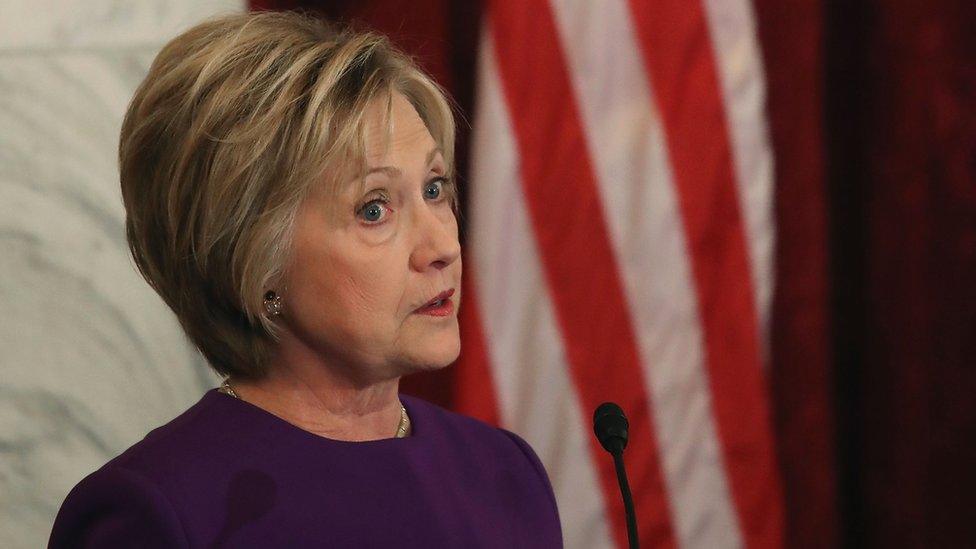
Hillary Clinton says false stories hurt her presidential campaign

Join the conversation

Useless words?
Since then phrase has been used more or less continuously by Trump and other world leaders, as well as by countless political operatives, journalists and ordinary people. As a rough guide, a Google News search of "fake news" throws up 5 million results, and already in 2018 the phrase has been used about two million times on Twitter.
And, contrary to the conventional wisdom, it's no longer a stream of falsehoods eagerly swallowed solely by Trump supporters and/or those with little education. By April 2017, Trending was reporting on the phenomenon of left-wing, anti-Trump fakery. Experts say highly-educated people can be duped by lies as well - and can often be more stubborn when presented with information that challenges their views.
But within months the sheer ubiquity of the phrase "fake news" had perhaps rendered the term meaningless. All sorts of things - misinformation, spin, conspiracy theories, mistakes, and reporting that people just don't like - have been rolled into it.
"We did this to ourselves, and by 'we', I mean the media," says Alexios Mantzarlis, director of the Poynter Institute's International Fact-Checking Network. "Right after the election, in editorials, in news articles, we started calling 'fake news' a bit of everything.
"We should be conscious that our industry is partly to blame for the confusion we're at."
And some experts with huge experience in the field have started to back away from the fake news fire altogether.
"The reason I don't like the phrase now is it's used as a term to describe everything," says Clare Wardle of First Draft News, a truth-seeking non-profit based at Harvard's Shorenstein Centre. "Whether it's a sponsored post, an ad, a visual meme, a bot on Twitter, a rumour - people just use it against any information they don't like."
"This is a really complex problem," she says. "If we're going to start thinking of ways we can intervene, we're going to have to have clear definitions."
How did we get here? 'Fake news' in about 90 seconds

You might also be interested in

Wardle says that an obsession with the phrase (and yes, this story admittedly might be a part of that) is actually hurting the credibility of otherwise credible news outlets.
"My concern now is the kind of reporting we see on disinformation," says Clare Wardle. "People are saying, 'I don't know who to believe or who to trust, everything's broken.' My concern is the way that we're talking about some of these issues is actually doing more than the original misinformation did in the first place."
Mantzarlis says that while he's concerned about language creep, he isn't ready to abandon it altogether - although he would like to see "fake news" restricted to descriptions of spammy made-up stories wrecking Facebook news feeds.
"Just because someone else is using the term to mean something different doesn't mean it loses its value," he says. "If someone starts calling a telephone a banana, and has a very big megaphone, doesn't mean that the rest of us should stop calling a telephone a telephone."
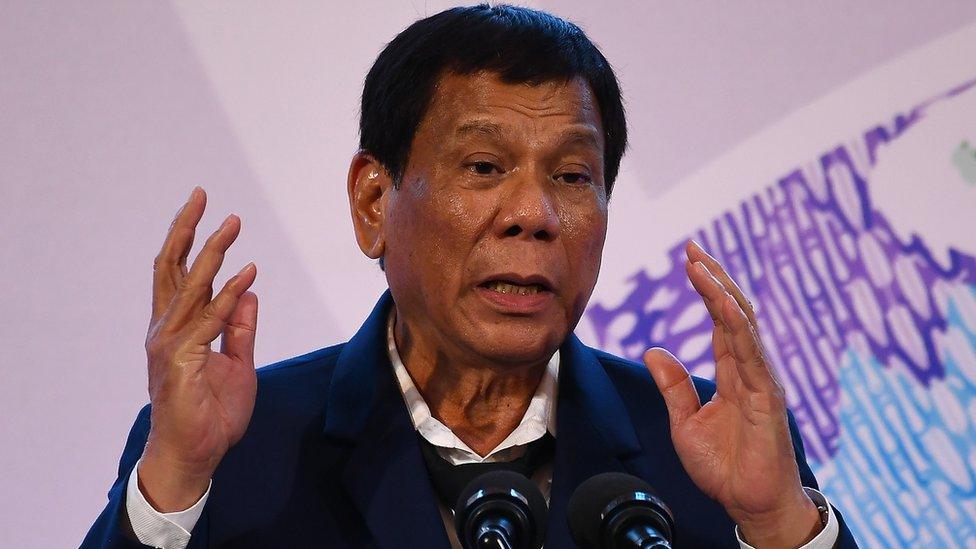
Leaders including Philippines President Rodrigo Duterte have also complained about so-called 'fake news'
Going viral
Clearly the enabler of the modern form of "fake news" - or, if you like, misinformation - has been the explosive growth of social media.
"In the early days of Twitter, people would call it a 'self-cleaning oven', because yes there were falsehoods, but the community would quickly debunk them," Wardle says. "But now we're at a scale where if you add in automation and bots, that oven is overwhelmed.
"There are many more people now acting as fact-checking and trying to clean all the ovens, but it's at a scale now that we just can't keep up."
So what to do about it? Fact-checking works, says Alexios Mantzarlis, but automated solutions are probably not the answer.
"We're been heralding robotic fact checking for about 20 years and we're nowhere near it," he says. "What we can do is help humans and journalists find fishy claims faster, and get access to the stats that they need to verify a claim faster."
"I see an enormous potential in technology as an assistant and turbocharger of fact-checking," he says. "I see very little use in technology as a one-size-fits all universal fixer of this problem."
But all the fact-checking institutions in the world will never be able to beat down every rumour or fake "fact". And while some media reports have cast doubt on the efficacy of fact-checking, external, Mantzarlis is convinced that his work has an impact.
"What we've seen over the past two years is that consistently, across the board, regardless of partisanship, when people get told a falsehood and get presented with a correction, their belief in the falsehood goes down," he says.
People might be "fact resistant", but very few are "fact immune", he says.
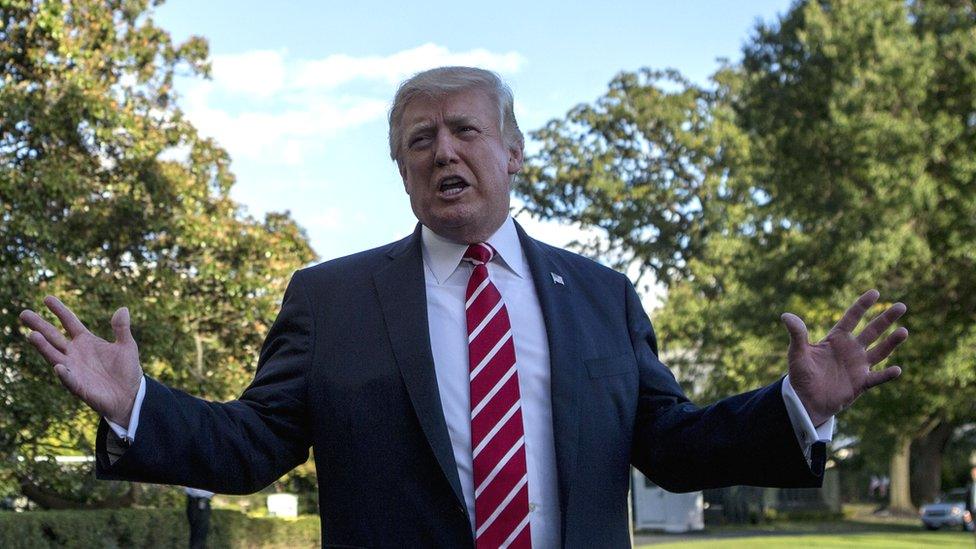
President Trump handed out his own 'Fake News Awards'
The future of fake
In the future, the term "fake news" might come to be seen as a relic of a febrile 2017 (if we're lucky). But the fight against misinformation won't go away. Companies and governments are now starting to take concrete action, the consequences of which will be felt for some time.
"Google and Facebook have both said that they are going to be hiring a lot of people to review content and enforce their terms of service and keep fake and illegal stuff off their platform. I'm interested to see how that is actually done," Buzzfeed's Silverman says.
"The opaqueness of these platforms and their power and the fact that so much speech has moved on to them is something that we need to pay attention to and make sure that we don't turn them from places where misinformation is running rampant to places that are so locked down that they are inhibiting speech," he says.
Alongside worries about the power of the social media companies, the experts also have concerns about the power of governments.
"Sometimes well-intentioned but ill-informed legislators will overreach and do more harm that the problem they are trying to fix, with legislation on fake news," Mantzarlis says, noting that legislation is being proposed in several countries across Europe.
The most sweeping such legislation came into effect on 1 January in Germany. The law demands that social media sites quickly remove hate speech, fake news and illegal material or face fines up to 50m euro (£44.3m, $61.1m).
And beyond viral political text news stories, there are new frontiers which fact-checkers are trying to delve into.
"I really think we need to be thinking of visuals more. Visuals are very powerful vehicles of disinformation," Claire Wardle says.
Often photos are travelling with rapid speed on closed messaging apps such as WhatsApp or Viber. And while the discussion about "fake news" has focused on the West, a lot of misinformation like this is circulating about health, religion and society outside of the US, in developing countries.
"The power of something like WhatsApp is that it's travelling between very close networks of peers who are much more likely to trust each other," Wardle says.
Impact?
There's one essential question - what impact does misinformation really have in the minds of voters? Ever since the debate over the issue really took off a little over a year ago, there's been enormous disagreement as to whether false stories spread online actually have any impact on people's politics or voting patterns.
In one of the first academic studies about the consumption of fake news, external, researchers at Princeton, Dartmouth and the University of Exeter estimated that about 25 percent of Americans visited a fake news website in a six-week period around the time of the 2016 US election.
But the researchers also found that the visits were highly concentrated - 10% of readers made 60% of the visits. And crucially, the researchers concluded "fake news does not crowd out hard news consumption."
"The reach was relatively wide, but not so deep," Mantzarlis says. "It's quite a big step further to say, are people voting on this, making decisions on it."
"To say it's poisoning our democracy or it won this guy or the other guy an election, we need a lot more research to be able to say that."
Do you have a story for BBC Trending? Email us, external.
You can follow BBC Trending on Twitter @BBCtrending, external, and find us on Facebook, external. All our stories are at bbc.com/trending.